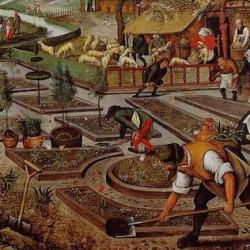Here is a brief outline of a presentation I gave today. The suporting evidence is scattered about various posts from the past two weeks.
1) The thesis: It may be true, as free market economists say, that the economy would be more stable and perhaps even more prosperous if the state left the market to itself, with the qualifications that Smith, Mises, and other classical liberals offer. But we don’t know that in historical fact, because free markets in this sense have almost never existed. Most modern economies in particular have been in important ways creations of state power, and modern economies function as they do now because of the continuing exercise of state power.
Note: The thesis is not primarily theoretical or normative, but historical. The history has significant implications for economic theory, which I am quite sure some economists have worked out in great detail.
2) Insofar as this historical thesis makes some theoretical assumptions, they are twofold:
a) The notion of a state “intervening” in economic life presupposes that state and economy are two more or less closed zones of activity. But the separation of an “economic” from a “political/legal” sphere is not a permanent fixture of human societies. It is in large measure a modern creation.
b) Even in the modern world, this separation is more theoretical than real. Social, kin, religious, and political factors are always at work in the economic sphere. They are not interventions in a separate sphere, any more than economic factors “intervene” in what is essentially an un-economic family sphere.
Note: These two theoretical assumptions are themselves historical claims.
3) If accurate, this historical claim highlights the over-simplification of certain sorts of conservative/libertarian rhetoric, such as, “The economy would flourish if the government would just get out of the way” or “We owe our prosperity to an economic system into which the state does not intervene.” My thesis is that such rhetoric, and the economic theory behind it, is ahistorical. In fact, modern states have always intervened in economic activity in one way or another. Perhaps we would be even more prosperous without state interventions. But as a historical matter, we cannot know because that is not what happened.
4) More broadly and fundamentally, if the historical claim is true, then it is overly simplistic to defend the market as part of an anti-statist political stance. Because modern economies were often created, often encouraged by the actions of aggrandizing states, any critique of modern statism indirectly implicates much of modern economic life.
5) For support for this historical argument, see earlier posts with quotations from Nisbet, Werner Sombart, and Charles Tilly. See also the more detailed posts about enclosures, US protectionism, and the rise of the Korean economy.













